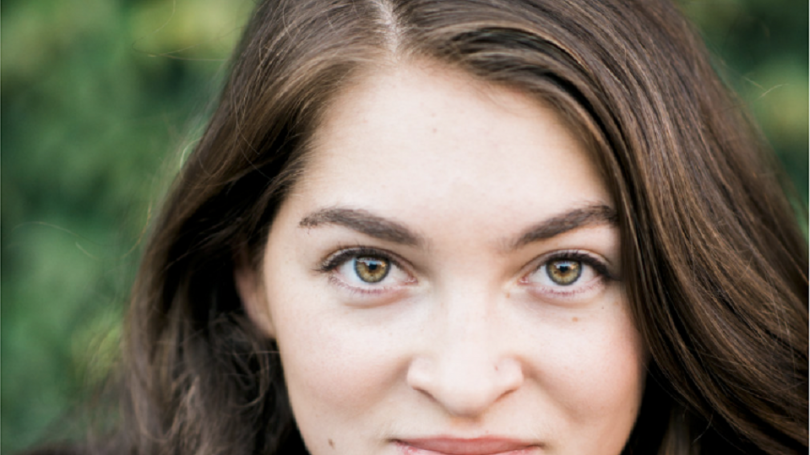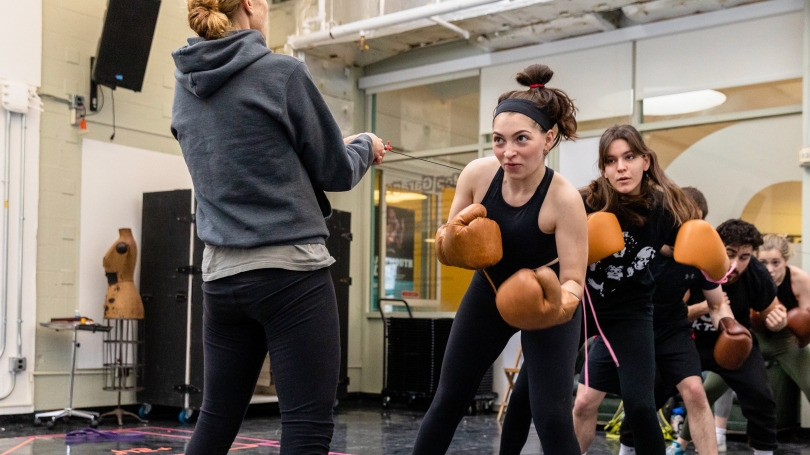"Bruising" Women: Brooke Bazarian '20
In anticipation of The Sweet Science of Bruising's US premier, we spoke with the actors who portray female boxers in Victorian England. This is the third of four interviews.
Starting February 21, The Sweet Science of Bruising will be making its US premiere at the Hopkins Center. By British theater and TV writer Joy Wilkinson, the play follows the stories of four Victorian-era women, and how their lives become intertwined within the underground boxing scene. Each with her own motivations and backstory, the unlikely group of women find themselves inextricably linked to each other through their struggle to navigate a male-dominated sport at a time when women were granted few freedoms and rights. Who are these women, and how did they find themselves in the boxing ring? Today we meet Polly Stokes, played by Brooke Bazarian '20.
How would you describe your character, Polly Stokes?
Polly is a "pit brow lass" which specifically means that she works in the pit brow in the coal mine. She is the one collecting the coal as it comes in. It's a really dangerous job with terrible hours and conditions.
She's from Yorkshire and was left on the doorstep of the Stokes family as a baby. She was a very sick child also, but the Stokes essentially brought her up. Her "brother" is Paul Stokes and they grew up boxing and sparring together, and that's where she learned how to fight. She starts off the play as a fighter, but because it's the nineteenth century and she's a woman, she can't really fight, so she lives vicariously through Paul. But she also finds her freedom throughout the show. In the beginning of the play, she thinks that she has it, but throughout the play she realizes that she isn't actually as free as she thought she was. But by the end of the play, she gets it back.
How do you relate to Polly?
I was joking with the costume department about this because Polly has many moments that remind me of myself. I think of myself as pretty no-nonsense, and certainly standing up for what I believe in. I also often get frustrated when things in the world can't be the way that I want them to be, and then so is Polly.
There is also the aspect of knowing what it feels like to be a woman living in a world that is not built to help women succeed institutionally, culturally and socially. So there is instant identification with the moments of feeling invisible, or not being able to do what I want to do.
Do you think the play is relevant in this day-in-age?
I think the play is very timely. Despite the fact that it's set in Victorian England, there are so many parallels to what women go through today. What I love about this play is that the women are fully fleshed out characters and are so complex, but they are also tough as nails. They break all of the expectations and stereotypes that were assigned to women at the time. And many of the women today that are in the government, or in male dominated institutions are like that -- they refuse to be put into boxes.
It's also extremely hard to find a play with four main female characters. This play is very revolutionary in the fact that there are only three or four men in it, and they are side characters. And the main male character, the professor, is very sexist and misogynistic in his own way, but also does have a hand in building these women up and giving them the freedom that they want. So he's almost presenting as a misogynist, but his actions speak otherwise.
What has been the most challenging part of playing Polly?
I had to learn how to box. I have quite a few fights, so the amount of choreography I have had to cram into my brain can be pretty overwhelming. And it also does take a physical toll. In terms of her character, Polly is probably more aggressive than me, and she also has very animalistic instincts. I don't mean that in a barbaric way, but everything is very fight or flight for her. I live in a very comfortable world so that was not the type of upbringing that I had. Everything Polly does in the play she does to survive. It's broken down to basic instincts, and that can be kind of difficult for me to wrap my head around. Things are much more low stakes for me, but her life is very moment to moment. And I think that has interesting parallels with what it's like to be in a boxing match -- you always have to anticipate what's going to happen. She's living by the breath.
What do you make of the title, "The Sweet Science of Bruising?"
I've thought a lot about the meaning of "the science of bruising" -- and that phrase comes up a lot in the show. The idea of boxing being a science is very prominent in the play. It's the professor's idea that boxing can be elevated from an art into a science. Which is interesting because that is often the reverse of how we think about those two mediums. But I think it's a perfect way of describing what boxing is to these women because to them, it's their salvation. All of them find freedom within it, and that's what makes it sweet. There are moments of domestic violence in the play which is sort of the antithesis to that -- but the boxing is about reclaiming their bodies and their power that they lose in those moments. So boxing is a beautiful thing, even though it can be thought of as ugly and violent.
The play touches on many sensitive issues. How has the cast worked together to create an environment of mutual trust?
It's a small cast, which I think is crucial. There is so much trust that needs to be there, or the play would just not work. Part of it is the physical trust, because the type of boxing we are doing is tricky since its stage fighting. The only thing keeping us from actually hitting each other is our distance, so we have to trust that the other person is gauging that distance carefully. But there is also a very specific bond that comes from dealing with these difficult topics. And a lot of them are topics that may be personally raw for some of us, and not at all stuck in the Victorian Era. We've certainly become a close cast very quickly.
What was it like seeing the original show in the UK? How did that experience shape how you have chosen to portray Polly?
I saw the original production in London, and the minute I saw it, I knew I wanted to be in it. And there is something really special and exciting about seeing the original production and recognizing that you want to be in it for some reason, and then actually being able to do that a couple of months later.
The actress who played Polly in London was amazing, and a total professional. I think in my performance, I want to find a little bit of Polly's stillness. There is a stage direction that describes polly as a "livewire" and that she is constantly on the move. And that is totally true -- she doesn't ever want to sit still and she always wants to be fighting someone. But I also think that she benefits from moments where you can really see her soul a bit more. And I think that if she is constantly at the level of high energy, it's difficult for that part of her to show through. I am trying to find moments where she is not at that level, and there are totally moments of that in the show.
It can be very difficult to not copy one interpretation of the part. It's hard to have a very specific vision of someone in your head, playing the part, and then go play that character and not mimic what they did. But there are definitely parts of our production that are different from the original.

